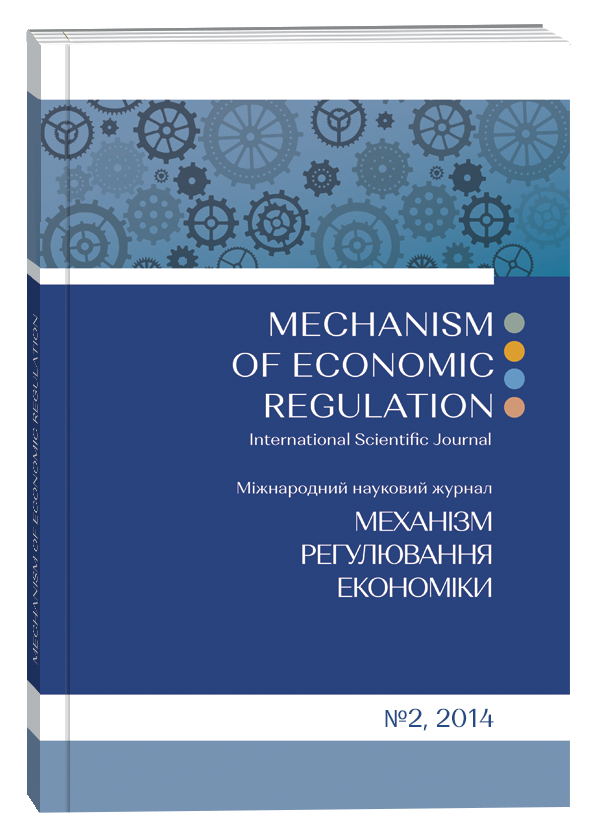ON THE ISSUE OF DECISION-MAKING IN SOCIO-ECONOMIC SYSTEM FROM THE POINT OF ITS DEVELOPMENT
Abstract
Activity of socio-economic system is performed in the context of interrelated processes, which usually have variability. Determining the direction, criteria and results of development is possible if socio-economic system operates stably with deviations caused by chance reasons. Therefore, reducing the variability of the socio-economic system by increasing stability is the condition for its development. It is suggested to increase stability based on make decisions concerning social and economic components of socio-economic system applying system and logical approach, structural and functional approach, synthesis and analysis methods. Social component of socio-economic system stability lies in its ability to react adaptively to new social needs without changes of current level of economic balance. Economic component of socio-economic system stability consists in ability to improve or maintain current level of economic efficiency.
References
Измалков, С. Теория экономических механизмов (Нобелевская премия по экономике 2007 г.) / С. Измалков, К. Сонин, М. Юдкевич // Вопросы экономики. – 2008. – № 1. – С. 4–27.
Ларичев, О. И. Теория и методы принятия решений, а также Хроника событий в Волшебных Странах / О. И. Ларичев. – М. : Логос, 2000. – 296 с.
Мельник, Л. Г. Методология развития : монография / Л. Г. Мельник. – Сумы : Университетская книга, 2005. – 602 с.
Нейман, Дж. фон. Теория игр и экономическое поведение / Дж. фон Нейман, О. Моргеиштерн. – М. : Наука, 1970. – 346 c.
Погорєлов, Ю. С. Інформаційні технології в оцінці та моделюванні розвитку підприємства / Ю. С. Погорєлов // Актуальні проблеми економіки. – 2008. – № 10. – С. 172–179.
Солсо, Р. Л. Когнитивная психология / Р. Л. Солсо. – М. : Тривола, 1996. – 600 c.
Устиновичиус, А. Вербальный анализ решений / А. Устиновичиус, К. Лоневски // Есоnomics and Management. – 2013. – № 2. – С. 212–229.
Урасова, А. А. Специфика взаимодействия и возможности управления в социоэкономической системе / А. А. Урасова // Ars Administrandi. – 2011. – №4. – С. 21–28.
Хамел, Г. Конкуренция за будущее. Создание рынков завтрашнего дня / Г. Хамел, К. К. Прахалад ; пер. с англ. – М. : Олимп-Бизнес, 2002. – 259 c.
Шинкарчук, С. А. Трансформация социо-эколого-экономической системы под воздействием эндогенных и экзогенных факторов / С. А. Шинкарчук // Экономика и управление. – 2013. – № 3. – С. 149–153.
Arrow, K. Reflections on the essays. In: Arrow and the Foundations of the Theory of Economic Policy / Ed.: G. R. Feiwel. – L. : Macmillian, 1987. – 734 p.
Boulding, K. General Systems Theory: The Skeleton of Science, Management Science, april 1956. – P. 197–208.
Bourdieu, Pierre. Ökonomisches Kapital, kulturelles Kapital, soziales Kaputal, in: Kreckel, Reinhard (ed.) Soziale Ungeichheiten (Soziale Welt, Sonderheft 2). Goettingen: Otto Schwartz & Co., 1983. – P. 183–198.
Simon, H. A. The New Science of Management Decision. N. Y. : Harper and Row Publishers, 1960. – 224 p.
Stecher, B. An Investor’s Perspective on the Investment Climate in Developing Countries / B. Stecher // Investment Climate, Growth and Powerty / Edited by Gudrun Kochendorfer-Lucius and Boris Pleskovie. – Washington D. C. : The International Bank for Reconstruction and Development / The World Bank. 2005. – P. 21–25.
Shewhart, W. A. (1939/1986) Statistical Methods from the Viewpoint of Quality Control. – N.Y., Dover Publications, Inc., (republished). – 160 P.
Yzmalkov, S., Sonyn K., Yudkevych M. (2008), “Theory of Economic Mechanisms,” Voprosy ekonomyky, 1, 4–27. (In Russian)
Larychev, O. Y. (2000), Theory and Methods of Decision-Making, as well as Chronicle in Finding Neverland, Moscow, Lohos. (In Russian)
Melnyk, L. H. (2005), Methodology of Development, Sumy, Unyversytetskaia kniha. (In Russian)
Neiman, Dzh. fon and Morheyshtern, O. (1970), Theory of Games and Economic Behaviour, Moscow, Nauka. (In Russian)
Pohorelov, Yu. S. (2008), “Information technology in assessment and modelling of enterprise,” Aktualni problemy ekonomiky. 10, 172–179. (In Ukrainian)
Solso, R. L. (1995), Cognitive Psychology, Moscow, Tryvola. (In Russian)
Ustynovychyus, A., Lonevsky K. (2013), “Verbal decision analysis,” Есоnomics and Management, 2, 212–229. (In Russian)
Urasova, A. A. (2011), “The specificity of the interaction and management capabilities in the socioeconomic system,” Ars Administrandi, 4, 21–28. (In Russian)
Khamel, H., Prakhalad K. (2002), Competition for the Future. Creating tomorrow's markets, Moscow, Olimp-Byznes. (In Russian)
Shynkarchuk, S. A. (2013), “The transformation of socio-ecological-economic system under the influence of endogenous and exogenous factors,” Ekonomyka i upravlenye, 3, 149–153. (In Russian)
Arrow, K. (1987), Reflections on the essays. In: Arrow and the Foundations of the Theory of Economic Policy, ed.: G. R. Feiwel, London, Macmillian.
Boulding, K. (1956), General Systems Theory: The Skeleton of Science, Management Science.
Bourdieu, Pierre (1983), Okonomisches Kapital, kulturelles Kapital, soziales Kaputal, in: Kreckel, Reinhard (ed.) Soziale Ungeichheiten (Soziale Welt, Sonderheft 2), Goettingen, Otto Schwartz & Co.
Simon, H. A. (1960), The New Science of Management Decision, New York, Harper and Row Publishers.
Stecher, B. (2005), An Investor’s Perspective on the Investment Climate in Developing Countries, Investment Climate, Growth and Poverty, Edited by Gudrun Kochendorfer-Lucius and Boris Pleskovie, Washington D.C., The International Bank for Reconstruction and Development, 21–25.
Shewhart, W. A. (1939/1986), Statistical Methods from the Viewpoint of Quality Control, New York, Dover Publications, Inc., (republished).


